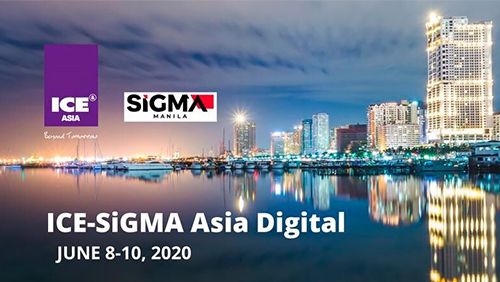
The time has come and the Asian region has finally got its own dedicated digital gaming conference.
These virtual shows have been the go-to experiential content and networking by the industry as replacements for the traditional on-the-ground event in the wake of a global pandemic.
Last week, the inaugural ICE-SiGMA Asia Digital Summit 2020 has commenced on the internet. The three-day heavily focused on Covid-19-related online discussions and debates among experts and executives within the gaming space was supposed to take place in Manila early this month, but was moved to 2021. Unlike other Asia-focused shows, the event was conveniently scheduled during the late afternoon in East Asia opening up the show to more audience from the other side of the world.
The show was free by registering to either of ICE and SiGMA’s respective sites to get access. Both shows were happening simultaneously on two different pages on the Swapcard online platform, where attendees can post their comments live, send in questions, participate in the poll and even exchange direct messages with each other.
Here are my takeaways from the virtual show.
By the numbers
According to SiGMA, they received over 4,000 delegate registration for the event, while ICE Asia saw over 1,600 virtual attendees all throughout the show. Both shows combined have over 110 speakers in more than 50 panel discussions and presentations.
For three days, I noticed an average of more or less 50 people active per session on the platform. Compared to physical live sessions, these are about the same number of people in the hall listening to a string of panel discussions, so that number wasn’t bad and is realistic.
Was the expensive investment in this digital platform, considering this number of people active on a half an hour basis, worth it? Well, we would love to hear from organizers delving into this in the industry.
By jurisdictions
The Philippines
The Philippines was and will remain Asia’s central hub for iGaming in the post-Covid 19 world. It is even considered to be larger than Malta and in other parts of the world, making Keith McDonnell, CEO of KMI Gaming, state that the country is the iGaming hub of the world. Though other territories like Thailand and Vietnam are emerging, this US$1.6 billion revenue generating jurisdiction will move forward with its 132,000 direct hires for the industry and lead the region. It will open up again within the month or in July the latest, according to PAGCOR Chairman Andrea Domingo.
Japan
The push for tourism in Japan during and after the pandemic may be an advantage for investors’ interests over Japanese integrated resorts (IR). Toru Mihara, the chair of the National Council on Gaming Legislation, said that his gut feeling tells him that the national government will continue to follow its IR development scheduled plan. This is in the wake of Prime Minister Shinzo Abe’s announcement that “IRs would support our efforts to become an advanced tourism nation.” The deadline for the issuance plan of the IR Basic Plan is on July 26.
India
India’s billion dollar betting market is predominantly focused on iGaming and it will also be its key market in the future. Right now, international operators are interested in slots, sportsbetting, and hyper casual games which are popular in the country. Legislation may take time and the regulatory process will be clearer in three to five years from now. However, covid-19 pandemic has accelerated and revealed the increasing digitalization initiative within the space. Lawyer Ranjana Adhikari, Co-Head of Media Entertainment and Gaming at Nishith Desai Associates, recommended international operators to start the process now,, as there are creative structures and unique models that can be made which are above the line of what is legal. This is to establish an active consumer base ready to merge with the regulatory framework when it’s ready.
Macau
Macau is seen to be the fastest casino industry to recover within the Asia Pacific region. Vitaly Umansky, an analyst at brokerage Sanford C. Bernstein Ltd. said that it is because it doesn’t have as much international visitor composition. It is also highly dependent on one market, China, whose citizens may not be able to travel further out of the country for a while. The timing of tourist travel returning to Macau this year is still unclear. Meanwhile, casino revenues approaching late 2019 numbers is, at this time, purely a speculation.
Other emerging markets in Asia, like Cambodia and Vietnam, will take much longer to recover. Singapore is anticipated to hit the same numbers as 2019 only in 2023 and will also have a slow recovery. Australia, on the other hand, has a strong local market. Though it has reopened casinos, the international market will be soft.
The experience
At face value, a digital summit seems very easy and quick. However, once you are on the platform, you will realize how much you get easily distracted by all the buttons, movements on the screen, or even an email notification. Sessions come in and out faster than you realize, and it could even be shorter than the actual schedule. One time, I checked my email and replied while a discussion was going on. When I got back, the session was already wrapping up. You have to stay glued in. It keeps you on the edge of your seat. So the challenge for organizers is to know how to keep that momentum for the audience to get engaged all throughout, without experiencing either info or screen fatigue.
On the practical side, digital conferences are an accessible and cheap alternative to consume content within the global gaming space. Not limited by time and space but only by internet speed, it provides a better option to continue on the immersive experience of a physical conference and exhibition during this extraordinary year.
It is also nice to see our industry peers gather together as they share their insights and best practices with the rest of the world as they always generously do, most especially in these challenging times. It makes me think that it isn’t the virtual space that is keeping us all connected, but the genuine intention of every industry member to rise above the challenges and come out strong together.
